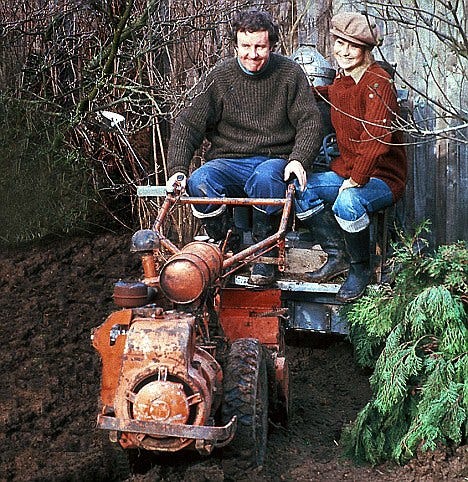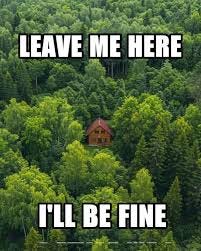No Island is an Island: Part 1
The Not-So Good Life
In the 1970s The Good Life was a much-loved sitcom, with the “situation” being a young(ish) couple packing in their jobs (mostly “his” job - this was the 1970s) and going back to nature - living off the land - going “off-grid” - whilst not moving out of their suburban London house. The comedy revolves around the garden being turned into a mini-farm, and the relationship with their more conventional, upwardly mobile and snobbish neighbours.
There are various pre-conditions for the concept to work - Tom Good can give up work as a draughtsman for a company that makes plastic toys for breakfast cereal packets - in part because (a) their mortgage is paid off (by his 40th birthday… dream on Millennials and Gen Z) and (b) there are no children to complicate things. So pack in the job and get back to nature.
In this fiction, they generate their own electricity with methane from animal waste, and attempt to make their own clothes. They sell or barter surplus crops for essentials they cannot make themselves. They cut their monetary requirements to the minimum, with varying success. (wikipedia)
The reality of course is lots of arduous and unglamorous work, as well as a hard interface with the real-world: minor things like needing fuel for the garden machinery. Ultimately, they can do a bit of farming and reduce expenditure - but are never even, not remotely, close to being self-sufficient.
Off-Grid Toff-Grid
I recently saw a comment on a LinkedIn post complaining that a house which has a “fully independent solar-battery system” is “still having to pay for grid costs”. This would be a valid complaint IF the house was really 100% off-grid. That is, if it has no grid connection for those pesky days/nights when the “fully independent solar-battery system” fails. But it obviously does have a connection, otherwise it wouldn’t be getting billed for grid charges.
When grid charges are applied pro-rata to consumption one might argue that there is social justice - bigger (wealthier) users pay more. However, when wealthier parts of society can play with going “off-grid” and thereby reducing their grid-utilization, their contribution to the overall grid declines. The kicker, of course, is that they still want the grid to be there….
To understand the problem, consider this: to have roof-top solar you need to own a roof - so that excludes most lower-income households in apartments and/or rented accommodation. You also need to have significant up-front capital for solar and batteries (and installation), and you need to be a tax payer to benefit from tax credits. Once you have done all that - you become a “free rider” on the grid because you disproportionately push the grid costs to your poorer neighbours. Can we have a big shout-out for social justice? Happily, this unforeseen consequence is being addressed in many places with high penetration of roof-top solar, albeit with the result of making roof-top solar less attractive.
The Alure of Off-Grid
You don’t have to spend much time on Social Media before seeing people celebrating their “off-grid” lifestyles - which usually involves a backwoods cabin (with propane tanks) or a converted pick-up truck for “van-life” off-grid. This usually involves a dog or two and some back-story of romantic heartbreak….
But can we ever really be “off-grid”? The answer depends a bit on what you mean by “off-grid”. If this literally means not being connected to the electricity system, then the answer is yes. BUT, and this is a big “but”, if you have any product, be it as simple as a shovel, you are still part of the modern system unless you are literally living naked and afraid on a remote island. So you might be “off-grid” in the narrow sense, but you are still very much part of “the system” and “on-grid”.
This distinction is important because there is a lot of virtue signalling in the “off grid” lifestyle movement that carefully ignores the absolute dependence on the on-grid part of society. Saying “we’re off-grid” and implying “you should be too, if you want to save the planet” would seem to imply a distinct lack of realism about how the system actually works; the photo above being a good example.
We have many examples of how complex modern life has become – a system in which we exist and operate without the faintest idea of how 99.99% of the things we use and rely on are made, or indeed, how they work. “I Pencil”, published in 1958, is an essay in which the author, Leonard E Read, unravels the deep complexity of the production process by reference to the fabrication of the common pencil. The choice of a simple everyday object like the pencil is deliberate – as it underlines that no single person has all the required knowledge to make something as a basic as a pencil.
At first blush this seems counter-intuitive, we can imagine that a craftsman might be able to put a graphite lead into a wooden casing, varnish it and add a metal ferule and a rubber eraser. However, that craftsman would not know how to find, let alone mine and process the graphite, nor make the graphite core, nor harvest and process the timber, nor process the chemicals to make varnish etc. Obviously, the same applies many-fold over to the making of more complex items. “I Pencil” was written to illustrate the wonder of the “invisible hand” – how a (market) system can create an object without central planning. However from the point of view of energy systems and the structure of modern society I read I Pencil as being a magnificent example of the complexity and interdependence that underpins everything.
Now take this idea and look at all that is required to obtain copper - a key component of the Renewable Energy transition. This fantastic substack by B F Randall should be required reading for all political scientists and concerned citizens. Electrifying a few mining trucks an energy transition does not make.
And remember, copper is just one component in the wind-solar-battery Rube-Goldberg future. For the Net Zero Utopia, one has to think about decarbonizing every aspect of the industrial and manufacturing processes, not just the end products.
Almost Flying
In the world of the Energy Transition where there is a global initiative/fantasy to completely dismantle an energy system and replace it with something “low carbon” – and to do that within 30 years - there are profound uncertainties in how this will be achieved. Whilst there are some activists, academics, journalists and politicians who claim via desk-top studies and clever modelling that “we have the technology, it just needs the political will”, a more realistic version is that we really have no idea if it is possible. We are bombarded with a narrative that certain regions or countries have made astonishing advances in converting to wind and solar and it is either stated or implied that there is a linear progression to the Net Zero Utopia.
However, we should not conclude that doing the easy bit offers anything predictive about the second part. Standing on one leg is not half-way to flying.
In the second part of this post (to follow) I will look at the nearest thing we have to a “100% renewable” economy - on a remote island - and show how this fantasy is not only far from flying, but is utterly dependent on the global economy, which is of course, far from being 100% renewable.






One further comment, the idea of Net Zero is all the rage these days, including Net Zero houses, but of course the Net is the keyword, and Net still means grid connected.
Genuine nice-living off-grid homes can exist, the passiv haus type things, but they are not easy to do, and as I said previously, very expensive and not necessarily all that easy to operate. They obviously go better in warmer or temperate climates. I recall seeing articles from years ago where some eccentric inventor types built passive style homes partly subterranean, with large earth berms, and using old Coke cans (empty) built in layers in the earthen walls as air insulation, etc etc.
It def easier today to build a low energy demand home with access to relatively cheap solar panels and batteries for storage, but even there, the PV only produces so much power, so there remain limitations on the use of electrical devices in the home.
Very good. The issue with the off-gridder types, is they are mostly wanna-bes and they don't generally have the skills to do the energy balances to determine what it REALLY takes, its mostly wishful thinking. The issue with the net-metering types, and why some of them get very resentful when they are finally called on their free-riding by the utilities, is they DO want to be off-gridders but they really cant, given their actual lifestyle needs. So they simply try to blame the 'big, bad capitalist' utilities who are 'out to screw the little guy'. Which is not actually true.
Trying to live off-grid and maintain a 21st century western lifestyle is extremely difficult to do, its probably only possibly if you have large amounts of money to design and build super-custom energy use systems and housing.
Of course it fairly easy to live off grid if you are willing to live in near poverty.